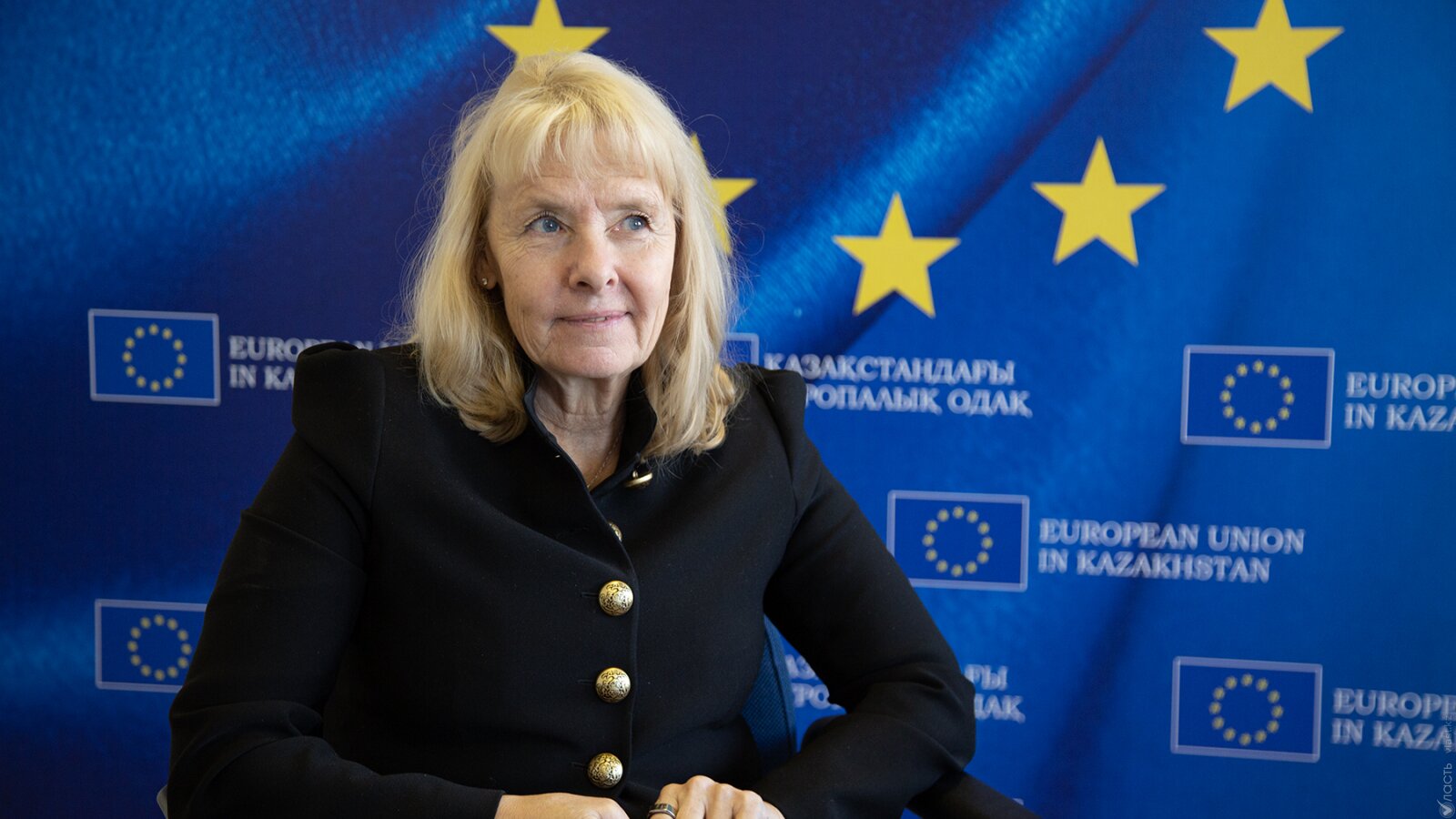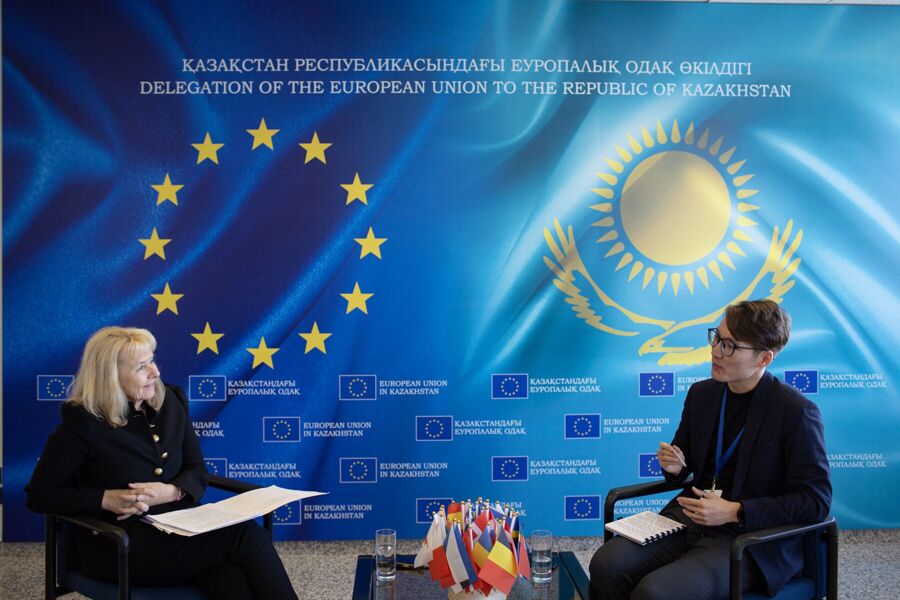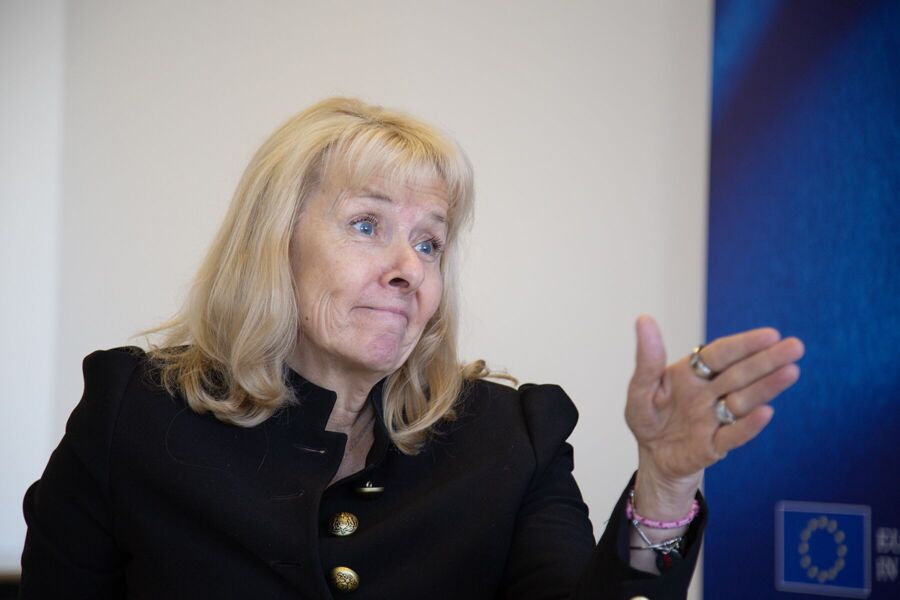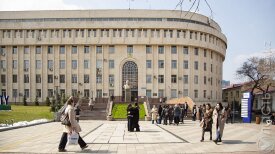Beiimbet Moldagali, Astana, Vlast, photo by Zhanara Karimova
On November 25-26, the European Union Special Representative for Central Asia Terhi Hakala visited Astana during her farewell tour to Central Asian countries as her mandate comes to a conclusion.
In an interview with Vlast, Hakala talked about human rights issues in Kazakhstan, sanction circumvention, and water resources in Central Asia.
Читайте этот материал на русском.
How do you reflect on your tenure as the EU Special Representative for Central Asia, and how do you see the relationship between the EU and Central Asia evolving in the near future?
I started in July 2021, just as the regime change happened in Afghanistan and the Taliban took over. Then, we had the January Events of 2022 here in Kazakhstan and the Russian invasion in Ukraine followed. There were also events in Karakalpakstan, Gorno-Badakhshan, and the ongoing clashes on the Kyrgyz-Tajik border. It's been a very active three and a half years within this context of geopolitical changes and in internal challenges within the region.
But I think the change in the geopolitical environment also allowed us to deepen and strengthen EU-Central Asia relations more rapidly. EU member states have activated their bilateral relationship with Central Asian countries, especially with Kazakhstan. Kazakhstan is a big trading partner of the EU.
Central Asian countries have been able, in the middle of all this, to strengthen their cohesion and regional cooperation. Support towards regional cooperation is the basis of the EU’s strategy. It's important that the region has become a subject on the global arena. Central Asia is very central nowadays, more than it has been for years. This is the positive side of all these negative events around us.
How would you assess the work being done in an effort to avoid the trade of dual use goods through Central Asia? Is Kazakhstan abiding by the EU’s sanctions regime? What are the areas on which your successor will have to focus?
When we introduced new sanctions packages after Russia’s aggression towards Ukraine, we started our cooperation with third countries. Kazakhstan and Central Asian neighbors are part of that dialogue. We have never actually demanded that Kazakhstan would align itself with the sanctions. What we have been requesting and asking is not to [help] circumvent the sanctions we imposed, we’re talking about dual use goods for the battlefield. We have quite similar lists with our like-minded partners, such as the US, the UK, and Japan.
We are looking into these things together and define what we mean with the battlefield products. We have had very good cooperation with Kazakhstan. Our sanctions envoy, David O’Sullivan, has visited Kazakhstan several times.
The whole point is that we want to stop the war from expanding, and through the sanctions we try to influence the Russian ability to continue the war. There are a wide range of sanctions, personal sanctions, economic, fiscal, and dual-use goods, that can enhance Russia’s ability to continue the war.
Kazakhstan’s government stated sanction circumvention happened in a few cases through “one-day” companies that import restricted goods and export them to Russia. Is the EU cooperating with Kazakhstan to avoid those situations? Are there any solutions for that?
This situation is common among different sanction regimes. Let's face it: There are always people who try to make full use of this kind of situation, because it's about big money. They sell products which are in high demand in the defense sector. We have a lot of data, and we see that trend, but Kazakhstan’s government has been cooperating very well with us.
We have to work with both ends, and we are definitely doing it in the EU countries. Our companies risk criminal charges if they circumvent the sanctions, if they break the rules. We've noticed several cases, and this turned into several investigations across the EU. These products are transported through different channels. It's an ongoing process, because those who are intentionally trying to circumvent the sanctions, change their pattern of behavior all the time. They have several tricks to do that, and that's why we have to be working closely.
In June, before the EU parliamentary elections, the lead spokesperson for the external affairs of the EU Peter Stano said that the partnership between the EU and Central Asia is limited by Central Asian countries’ “desire” and by EU principles and values. What are those values that matter to the EU in its relationship with Kazakhstan?
We always base our work on European values: all our agreements, all our strategies, they are based on our values of rule of law, respect for international commitments. We share the values of the UN Charter, the values of multilateralism. The agreements we forged with Kazakhstan also include these values. We see changes in Kazakhstan: From the political to the economic reforms your president has now launched.
We are very supportive of those, because these are precisely the same principles we mention in our bilateral agreements. What counts is the implementation and it is important that we work on that. In the current situation, things are moving very positively with Kazakhstan, which remains a strategic partner.
Are there any differences in values that limit the partnership?
We have a political desire [to cooperate]. Of course, we have certain issues on which we always discuss, but that is normal in all partnerships. I don't see any limitations or obstacles to having a high level dialogue and increased cooperation. On the contrary, I would say that we are very actively developing our cooperation.
You met the Ombudsperson for human rights in Kazakhstan Artur Lastayev this year and you reportedly discussed the new law on women’s rights and children’s safety. What are the human rights issues Kazakhstan still fails to address and solve?
With Lastayev, we discussed human rights as mentioned in our framework bilateral agreement. We go through different issues all the time, because I think that no country is free of human rights issues. We all have to do more. But during my last meeting with Lastayev, to which you referred, we were actually discussing freedom of expression, freedom of assembly.
On August 1, while the EU High Representative for Foreign Affairs and Security Policy Josep Borrell was visiting Astana, a working group was discussing the online petition against so-called “LBGT propaganda” at the ministry of culture. Human rights watchdogs said the petition is “discriminatory and stigmatizing” and that, if implemented, “would violate human rights across the country.” The ministry “partially supported the petition” and called to further research the issue. Should the support turn into legislative action, how would the relationship between the EU and Kazakhstan change?
First of all, I want to say that we actually are against any discrimination in society. This is about EU values. It's about the equal rights of all citizens, of all human beings, and whether they belong to religious or sexual minorities, it doesn't matter. We are fighting for equal rights for everybody, and this is kind of the starting point. Of course, it would be very regrettable if this kind of discrimination would be adopted, but the whole dialogue is about the big picture of discriminatory policies. I'm sure that my boss Borrell would have given the same answer.
I cannot foresee what will happen if this kind of action will be approved. Member states would make a decision. I know that they would not be happy, because in Europe, we are fighting for equal rights for all: People, women, and children.
What do you mean by big picture?
I mean that human rights encompass a wide range of things. Water is also a human right. Sometimes in our dialogues, our focus is too narrow. This is about the big picture, how society is developing. What are the rights within civil society? How, for instance, is Kazakhstan responding to the demands and commitments it has made in the UN Framework, the OSCE, or bilaterally, also with us. These are global values, because human rights are global and they are indivisible. It's not just some sectoral things.
The EU and Central Asia have long negotiated easier access for Central Asians into the Schengen zone. How do you measure progress in this regard? What are the necessary conditions to ease the travel regime?
I am a big supporter of this visa facilitation process. It's in the hands of the EU Commission and the member states, and the process has started.
In October, during the Cooperation Council between Kazakhstan and the EU, we discussed issues about the readmission agreement and the visa facilitation process. So that's in the pipeline.
We definitely want to be closer, and we are creating a new corridor of connectivity, the Transcaspian Transport Corridor. This means that we also want to create opportunities for people to move better and come to the EU and vice versa.
The readmission agreement is an important step here because we want to prevent illegal migration into the EU. All these agreements are interlinked. And because the member states have a say here, the negotiation goes a bit back and forth between the commission and the member states.
The goal is visa facilitation, so less documentation and a more consumer-friendly approach for those who are applying for a visa to the EU.
In regards to water use, how is the EU willing to help Central Asian countries and Kazakhstan in particular?
Climate change is already having a huge impact on water resources. Water issues are all linked to climate change, diminishing of water resources, melting of glaciers, upstream and downstream regions. We actually have several projects, within big framework portfolios called Team Europe, projects for water, climate, and energy.
Being a downstream country, Kazakhstan is very dependent on its neighbors. That's why we always push for regional cooperation, because the water challenges are transboundary.
Within Kazakhstan, the infrastructure has to be modernized in many ways.
In recent years, we have seen the leaders of Central Asia actually giving water issues a high priority. To me, this is a sign that there is a regional ownership to tackle these issues. The International Fund for Saving the Aral Sea is one of the tools in use, but there are also some other bilateral platforms, and when it comes to hydropower, for example. This is also linked to food security and agriculture. It's an issue which has to be on the radar already. It should have been there yesterday, because these challenges are here today.
Поддержите журналистику, которой доверяют.










